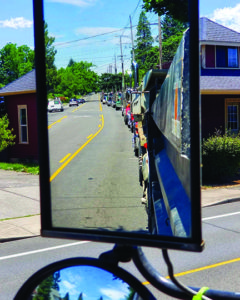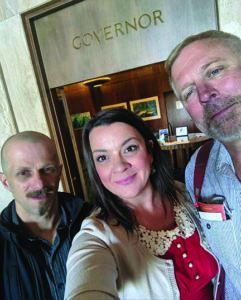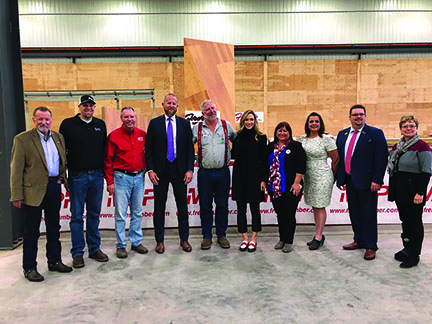By Sarah Brown
Lebanon Local
Timber Unity participants are warming up their trucks for another rally at the capitol on Thursday, Feb. 6, to put pressure on the Oregon legislature regarding what’s anticipated to be a successor to House Bill 2020, the cap-and-trade bill that spawned the movement last year.
A new version is expected to be brought up during the short session.
Supporters of the bill said it has the same caps on emissions and would still produce the desired results in regards to pollution reduction, as reported by Oregon Live. Changes would include: a proposal that transportation fuel providers in rural areas would be exempt from having to buy emission allowances; emission exemptions for food processing, pulp and paper industries; and rebates for industrial gas users.
When Angelita Sanchez, owner of Angel’s Rock-n-Roll Construction in Lebanon and board member of #TimberUnity, first heard about the fuel tax being proposed last year, she started to ask questions and participated in the three truck rallies at the capitol to oppose House Bill 2020.

“At first we probably had a handful of trucks, and then the next rally we had a couple hundred trucks, and then the final rally, where the Oregon 11 finally decided to walk out, we had thousands of people in trucks and tractors,” she said, referring to the Republican senators who fled the state in a successful effort to kill the cap-and-trade bill.
The cap-and-trade program is designed to reduce the amount of carbon dioxide that certain businesses can emit, though they can purchase allowances to go over their allotment. That, opponents say, is what fuels their concerns, that those costs would be passed down to consumers.
More specifically, the law would cause higher fuel costs, which is something those in the timber industry say they simply cannot afford.
“Twenty two cents a gallon extra per truck, and the market rate hasn’t changed in years; that could be $10,000 more a year just for the business,” Sanchez said. “Everybody’s barely eking a living out just to keep going, and so nobody can afford it. It’s extreme.”
Oregon Live reported that this year’s proposal attempts to reduce the impact of fuel costs on rural Oregonians, but Sen. Fred Girod told The Oregonian newspaper that the cost would still trickle down to rural consumers and would actually have a worse impact than the original bill.
Following the demise of HB 2020, #TimberUnity’s work has not ended. Representatives

were invited to the White House for President Donald Trump’s speech, “America’s Environmental Leadership,” and then to a listening session at Freres Lumber with Lara Trump, the president’s daughter-in-law, and Brad Parscale, Trump’s campaign manager.
“They told us that President Trump has our back and (he’ll do) whatever he can do to help. I hope that that’s genuine,” Sanchez said. “He’s looking at Oregon, to come and campaign if he raises enough money and feels like it could be a possibility.”
If a carbon emissions bill doesn’t find favor with the legislature, the environmental advocacy group Renew Oregon is prepared to petition for a ballot measure to be put before voters.
 #TimberUnity hopes their momentum will continue as they prepare for their convoy next month.
#TimberUnity hopes their momentum will continue as they prepare for their convoy next month.
“They’re trying to push this through in the short session, so we chose Feb. 6 because it’s Ronald Reagan’s birthday,” Sanchez said. “I just love (his) quote, ‘Freedom is only one generation away from extinction, and now is our time to fight.’”
She believes the cap-and-trade program would basically enslave the people to more and more taxes for social agenda, she said.
“I’m worried about the dream of owning my own business being taken away without me being able to say ‘that’s not OK.’
“I’m worried that the people in the community aren’t going to be able to afford to heat their homes in the winter. I’m worried that small businesses in Oregon are gonna shut down.
“So I would be afraid of losing my business. I would be afraid of losing the dream that I have.”





